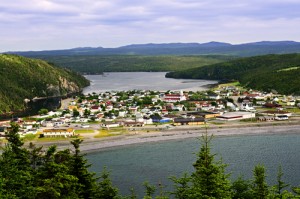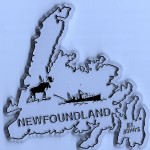by @AnnieDaylon

How’s she goin’, b‘ys?
I have just published a novel set on the island of Newfoundland–OF SEA AND SEED— and am often asked about the dialect of that part of Canada. The language is no doubt unique. A while back, I wrote this post about its source. If you have nare click nor clue about it, here (speaking strictly from me own neck of the woods which is Placentia), is the rights of it:
The dialect is owing to early settlers who hailed from Ireland, England and France. Groups arrived and settled together. Hemmed in by sea, no roads on land, they didn’t shift much.

Placentia, NL, about 135 km (85 miles) west of St. John’s.
Over the years, dialect evolved, due to:
1) World War II: An influx of American military personnel slowed the lilt of the language and added words such as ‘dime’ and ‘boyfriend’;
2) Resettlement: As fishing declined, people shifted from outports to larger areas;
3) Emigration: People moved away; some came back, talking large.
4) Immigration: People brought in new accents; and
5) Technology: The world is online and satellite TV is all over da place, b’y. Everyone watches the same shows and movies and, subsequently, speaks similar language.
Despite all of the changes, despite the fact that I now live in British Columbia, I cherish opportunities to hear Newfoundland dialect; those occur thanks to CBC shows such as Land and Sea, The Rick Mercer Report, This Hour Has 22 Minutes, and Republic of Doyle. But nothing replaces the real thing, b’y, and every year or two, when I make the twelve-hour trip from Abbotsford, BC to St. John’s, NL, I look forward to the sound that is distinctly Newfoundland.
On such a trip couple of years back, I dashed from the St. John’s airport, filled my lungs with fresh air, hopped into the first available cab and leaned back, ears at the ready. When the driver opened his mouth, his accent fell out and my heart fell to me boots. He was Eastern European. What the heck? Holy Lord tunderin’! Was the dialect disappearing altogether?
I allow I was disappointed, and I had a like to forget about the whole thing. But I didn’t. I headed to the DownHome Shop and O’Brien’s Music Store. I listened to VOCM radio in the mornings. I heard smatterings of dialect but, by the last day of my ten-day trip, I resigned myself to the fact that the accent was dissipating. What was the world coming to at all?
A sense of loss pervaded as I rang up a taxi service to schedule my trip to the airport.

Eastern Canada’s island of Newfoundland, Province of Newfoundland and Labrador
“Where are ye at, me love?” asked the dispatcher.
With my heart fluttering to beat the band, I told him.
“Sure, me darlin’, ’tis not us you wants now at all.”
I was some flummoxed (and right delighted.) “Excuse me?”
“Well, it’s like this. We’re way too far across town. Call buddy over at City Wide. He’ll get you there, guaranteed.”
So I thanked him profusely and called ‘buddy’.
The next morning, the driver arrived early. When I complimented him on his promptness, he said, “Ducky, when I has to be some place, I shows up like a bullet!”
I smiled the rest of the way to the airport. I was still smiling when the jet pitched in British Columbia half a day later. What a wicked time I had! 🙂
My best to you and long may your big jib draw!


I really enjoyed our short conversation about Newfoundland language.Maybe we can continue,the next time you are out for a walk,and I happen to be in your neighborhood.
Hi, Carl,
I enjoyed that conversation, too. Great to meet someone from ‘downhome.’ Look forward to another chat!
Annie
Loved it. Used to be we could tell what village someone came from. Now we can be lucky to know Canadian from Australian from New Zealander from South African and what part of England or Ireland. Then there’s what part of Quebec and of course, Newfoundland.
Thank you for the refreshing refresher.
You are most welcome. Yes, as you say, it’s hard to know where anyone comes from today. But what a great feeling it is, getting in touch with one’s roots! I really loved writing this post.
Hi Ange,
You may not receive this comment as I just realised the last posing was 2013.
I hope you do read.
Talking roots ….
I lived next door to you in Placentia.
I now live in England and go home every summer.
Newfoundland Is in my blood and I will never loose my roots.
Like you, the feeing you have when you are about to land at Torbay Airport cannot be explained in words.
An inner smile which spreads across my face does it forme.
The smell, the accents and the friendliness says you are home.
Once a Newfoundlander, always a Newfoundlander.
Maybe we can make contact and meet some day on the island.
Mary
Hello there!
Thrilled to hear from you! Lost contact with you many years ago but am happy to have a chance to get back in touch. My Dad still lives in NL and I go back as often as I can to visit. I do hope we can reconnect ‘back home’ someday. Am adding your email to my contact list!
All the best to you and yours,
Angie (aka Annie)